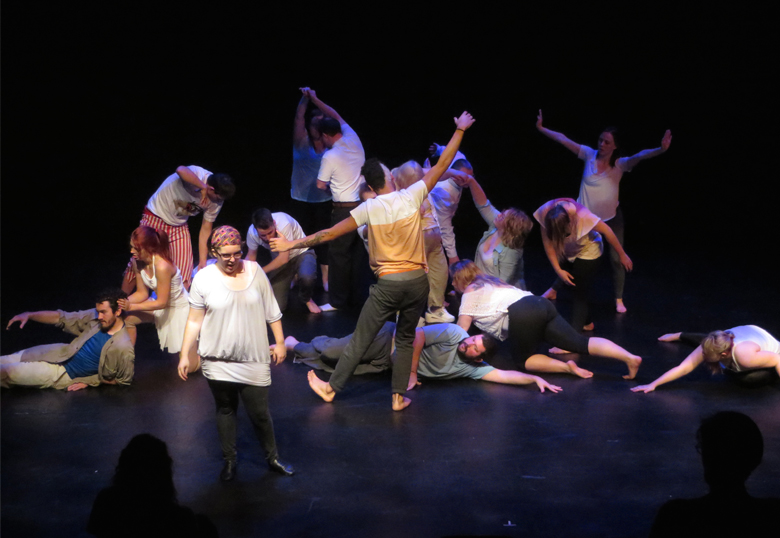The goal of Wednesday’s International Day for Persons with Disabilities (IDPD) is to increase awareness of the gains that come from living in an inclusive community that integrates persons with disabilities.

University of Lethbridge drama professor Lisa Doolittle has been working on creating such a community in one of her classes this fall. Of the 19 students enrolled in her Dance and Theatre for all Abilities class, six have an intellectual disability.
“Over the past year and a half, I’ve been partnering with the Southern Alberta Individualized Planning Association and with the Lethbridge Association for Community Living in research about using arts-based methods to make social change,” says Doolittle. “Currently, the research has taken the form of bringing people with disabilities into an existing drama department class and into a scheduled Main Stage production, which will be running in March.”
The class wrapped up recently with a workshop production and next semester, the students will begin work on their Main Stage production titled Unlimited. The show is a mixed abilities production created from the ground up by the students. While it’s still in development, Doolittle says it will focus on a big party, with characters developed from the cast members themselves.
“That really has not been done in our department. We’ve never had a production that has deliberately gone out of its way to cast members of the disability community,” she says.
Doolittle has been working with a Calgary artist, Pamela Boyd, former artistic director of MoMo, Calgary’s mixed ability theatre and dance company. Boyd has worked with students taking the class and she’ll also work on Unlimited.
Throughout the class and during the production, Doolittle is conducting research about teaching and learning in an inclusive environment. The research is funded through the Social Sciences and Humanities Research Council (SSHRC).
“For many people with disabilities, the wheels fall off after high school. They experience new barriers to their full participation in society,” says Doolittle.
She hopes to shed some light on that through her study.
“I’m interested in researching what happens in their lives and in the lives of the other students who participate with them, in the way we teach in the department, and ultimately, through the Unlimited production, in the public perception of these people with disabilities,” she says. “By living through the experience and researching it, I hope we’ll have a really clear picture of how this post-secondary inclusion idea may or may not work.”
While a university is considered a place for intellectual pursuits, students are also learning about friendships, collaboration and teamwork, educating the body and artistic expression, for example. Doolittle saw how those elements played out in her classroom this fall. The division between the students that was so evident at the beginning of the class didn’t take long to disappear.
“You can’t do theatre and dance without creating a community in your classroom,” she says. “The barriers come down.”
Inclusive theatre is being practiced across Canada and around the world and Doolittle wants her students to experience it, too.
“In the profession this is a big deal, so it’s another way for our students to join the professional world that we’re training them for,” she says. “I think they can confidently go out, having had this experience, and understand what it’s about and why you do it.”
IDPD will be formally celebrated in Lethbridge Friday at the Lethbridge Senior Citizens Organization with the ‘Picture This . . . On the Road’ film festival and a panel discussion, of which Doolittle is a member. Doolittle is also available to discuss her research prior to Friday’s event.
